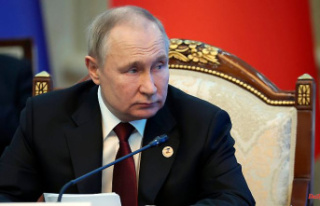Russian paratrooper Pavel Filatev has been fighting in Ukraine for two months. He then writes a book about the abuses in Putin's army and promises to donate proceeds to the Ukrainians. But when the publication brings in a surprising amount of money, a conflict arises with Filatev's helpers. They claim that the author wants to keep the fees.
Pavel Filatev is one of tens of thousands of Russian soldiers who invaded Ukraine on the night of February 24. The paratrooper was deployed on the southern front for two months before being sent back to Russia because of an eye infection. After his return, Filatev writes a book about abuses in the Russian army - and publicly promises to donate the proceeds to Ukrainians. But when the book appears in several countries and brings in a large sum of money, Filateev, who now lives in Paris, turns against his helpers who helped him escape and publish the work. They now accuse him of wanting to keep the income for himself instead of donating it.
In his book "ZOV" - named after the tactical markings on Russian army vehicles - Filateev, who invaded Ukraine with his unit from Crimea on February 24, describes everyday wartime life and his experiences at the front. The former paratrooper initially published the 140-page report in early August on the Russian social network vk.com.
At the beginning of his book, Filatjew criticized Russia's war of aggression against Ukraine, but later the ex-soldier primarily addressed the issue of wrong decisions by his own army, which led to failures in the combat zone. The author also describes his anger at Russian soldiers who refused to fight. In his own words, laying down his arms was out of the question. "We are bound to our comrades by patriotism, law and guilt, no one wants to be a coward. We cannot drop our guns and run away," writes the 34-year-old. And yet Filatev presents himself as an opponent of the war. While hiding from rocket fire in the trenches, he made a promise: "God, if I survive, I'll do anything to change that!"
Filatev survives - and after the evacuation from the combat zone, he initially uses his report to keep his promise. The Russian human rights organization Gulagu.net organized his escape to France, where he applied for asylum. The NGO also takes care of the publication of the report. In early August, Filatev declared in a live stream with the head of the organization, Vladimir Osechkin, that he wanted to transfer all rights to the book to the Gulagu.net and New dissidents foundation (NDF) foundations. The NDF is also headed by Osechkin. The proceeds should therefore be donated to charities in Ukraine. According to Osetschkin, both sides will sign a corresponding contract a month later.
The book has since been published in Germany, France, Estonia and other countries. According to Gulagu.net, it expects advances of more than 300,000 euros. But so far not a single euro has flowed into the account, as Osetschkin now writes on Facebook. Instead, Filatev wanted to sue the dissident fund. Accordingly, the former paratrooper accuses the NGO boss of pressuring him and forcing him to transfer the rights to the book.
"Me and our entire team, all those involved in the rescue of this young man, who paid for his tickets, hotels, taxis, transfers and everything he needed from their families' budgets, (...) the brought him clothes and money without hesitation, which made all his travels possible within the framework of the asylum and protection procedure, we are all in shock and stunned," writes Osechkin on Facebook.
Does Filateev want to keep the money for himself? At the request of ntv.de, the 34-year-old said he was preparing a statement in which he wanted to describe his view of the situation. The statement will soon be published on Facebook. The ex-soldier presents himself as a successful author on social media. He posts photos from autograph sessions, photo shoots and interviews. In the comment function under one of the pictures, Filtaev argues with Osechkin. They accuse each other of lying and hypocrisy. Otherwise, Filatev did not comment on the allegations. He has since deleted the photo.
Osechkin suspects that Filateev initially did not believe in the success of his book and that it could be a large source of income. But when he understood that the book could bring in a lot of money, he changed his mind and wanted to keep the money instead of donating it.
In view of the about-face, Osechkin now has doubts about the credibility of Filatev's report from Ukraine. "If he is lying now, we would have to thoroughly check the content of the book again," the human rights activist told the Belarusian exile TV channel Belsat. "We will advocate a temporary suspension of sales of the book."












